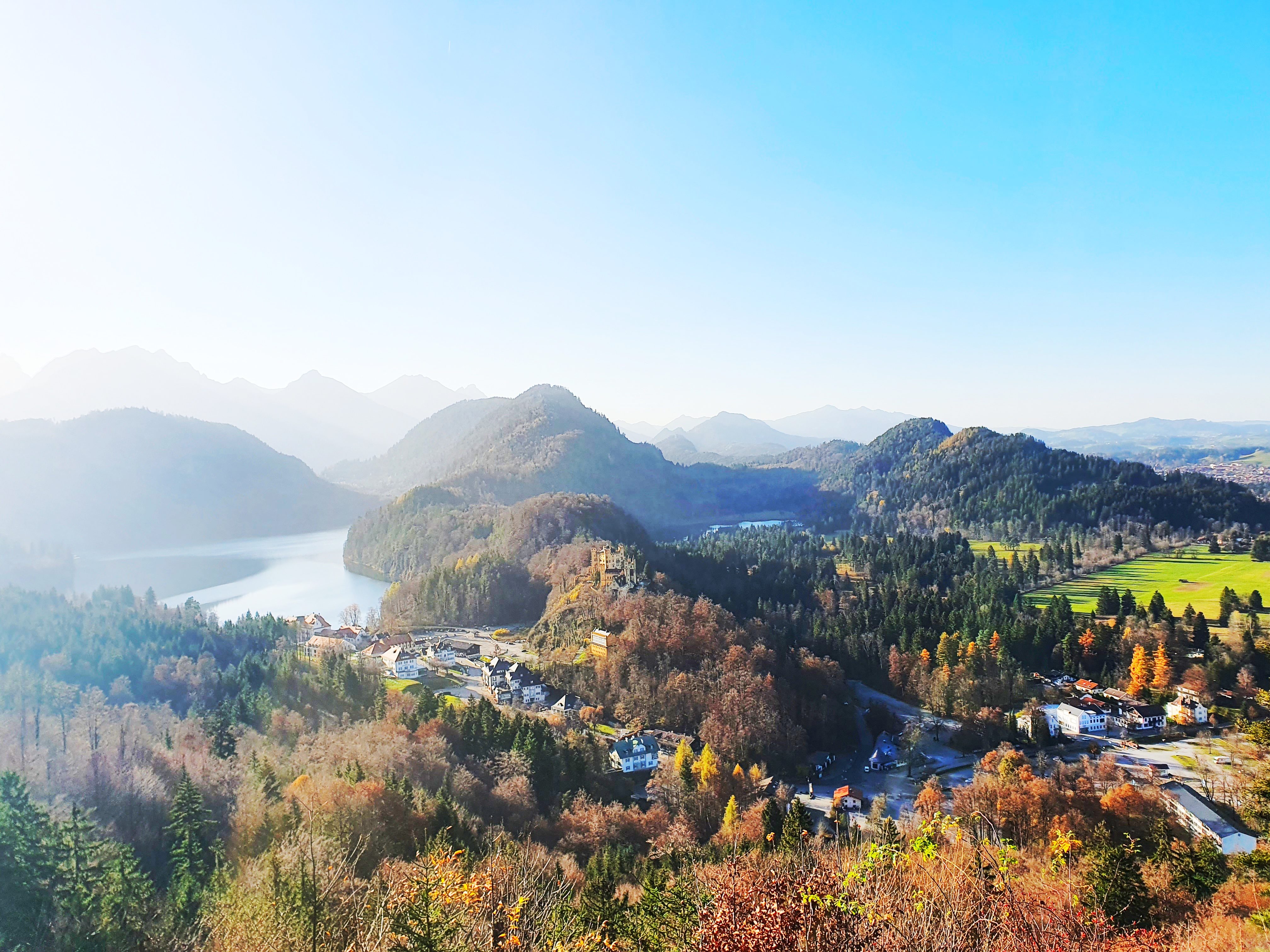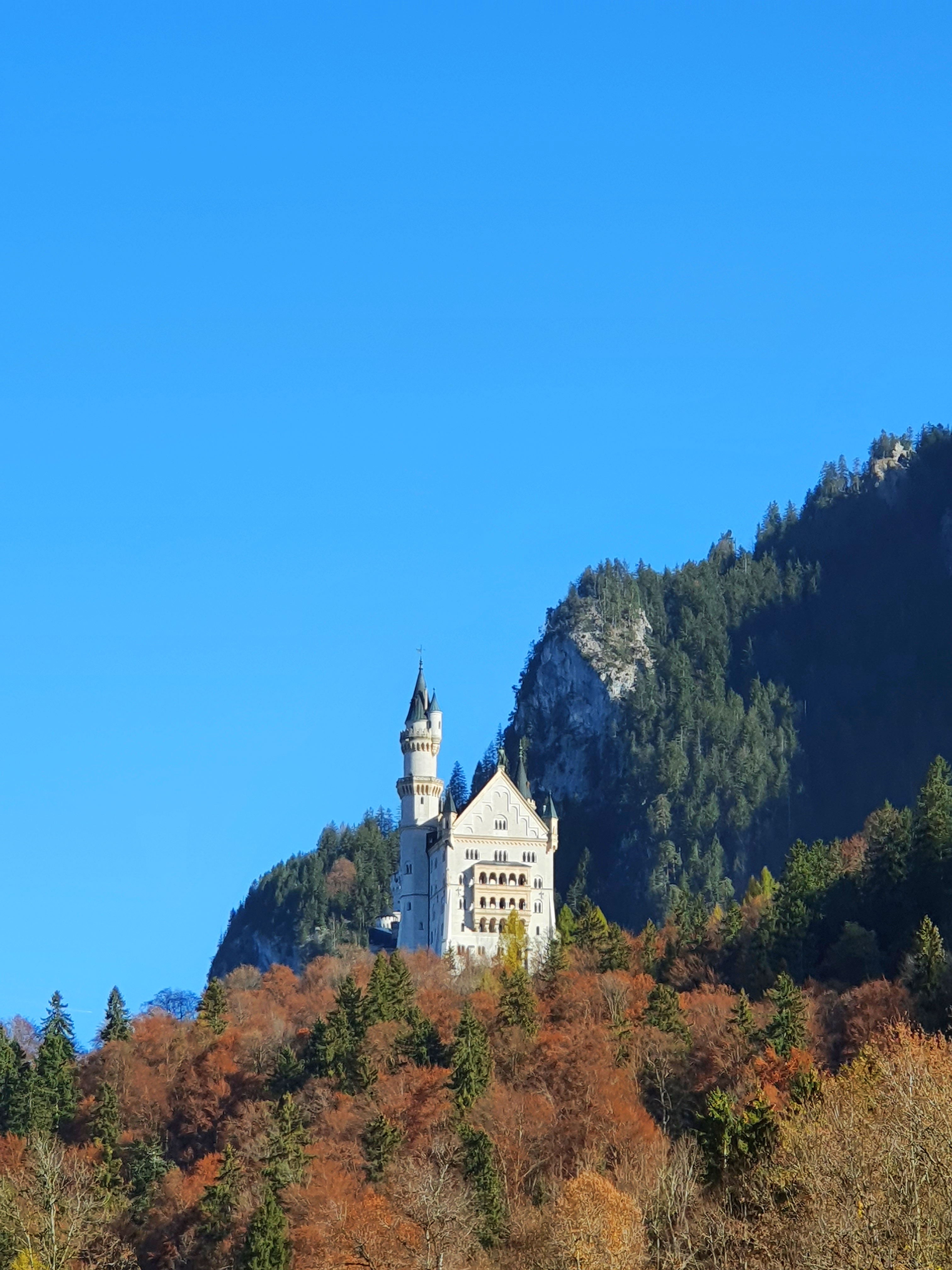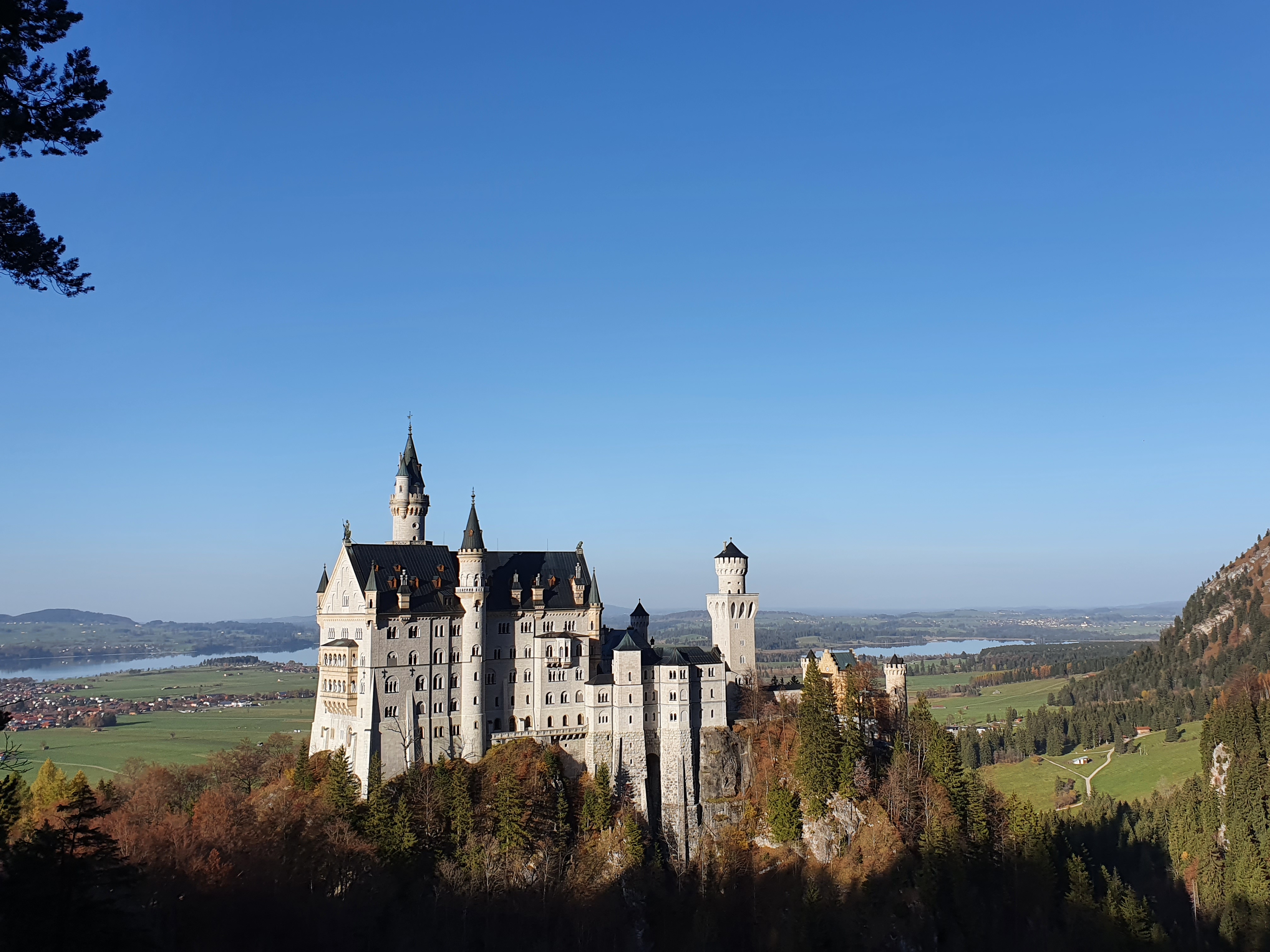For those of you who follow our Instagram account you will have seen that on Monday, the sun was shining down on our little piece of the planet, so us four weasels took a cycle across from our cosy little hidey hole in South Bavaria to the impressive dreamlike Schloss Neuschwanstein. Now rationally you might expect a review of the palace and the surroundings and that is what I had sat down to write. Instead I have ended up giving you a look into my head and some of the discussions me and Gemma had, inspired by this colossal beautiful folly.
We had taken the scenic route to Schloss Neuschwanstein, choosing to follow the winding course the shallow Vils Fluß as it joins up with the power of the Lech river.
We took this route in part to soak in the breathtaking grandeur of the northernmost Alps as we crossed in and out of Austria and in larger part because my firstborn daughter, though bright and intelligent in many ways has all the road survival skills of a hedgehog and can often be seen happily daydreaming on a main road, bike vearing from side to side as she weaves her merry way along, mindless of cars and trucks hurtling past. So in order to prevent her from being flattened, or Gemma becoming so stressed that she bleeds from the eyes, we continued our cycling training away from the traffic.
When the sun is shining the November mountains are awe inspiring, the deep oranges and fiery reds of Autumn mixed in with the dark evergreen pines that cling to their slopes. Being an experienced mountaineer I understand the importance of a map and good navigation yet being a complete klutz I had neglected to bring one. So with the help of google maps on Gemma’s phone (mine was back with the map) we felt rather than navigated our way towards the castle.
Thankfully the Germans are rather better organised than us and we soon found signs for the castle along a footpath that we rode along merrily enough, me and the kids on sturdy mountain bikes, Gemma on a rather striking blue bike that you might imagine an old lady cycling to the shops on to get a loaf of bread in 1920’s Paris. Fair play to Gemma though she kept up just fine on an increasingly treacherous footpath that was becoming narrower and steeper all of the time. Children have an inbuilt resistance to spotting danger so Izzy and Sam spent a good deal of time chatting as they rode merrily beside sheer drops and had to be ordered off of their bikes when the terrain became truly dangerous. We pushed our bikes therefore along what we had now realised was in fact a fairly challenging walking route, plowing on regardless (as is our wont) riding some of the down hills but pushing for the most part.
As we progressed following the signs towards the castle we squeezed our way past better prepared german hikers with boots and poles etc and tried out our faltering German, to always be responded to in perfect English. During one of these conversations we were told “you cannot bring bicycles on this track” we thanked them for the information and were forced to immediately prove them wrong as by now we were a good couple of miles in and didn’t fancy turning back.
This got us thinking about how we use language. ‘You cannot’ is often used when ‘I’d prefer you didn’t’ or ‘it is a bad idea to’ would be more accurate, but the latter would not have the moral force implicit in the former.
Gemma observed that there hadn’t been a sign which pushed us deeper down the same rabbit hole of thought. Had the nice German man with opinions about bicycles (who I will call Fredrik as I failed to get his name) been in a uniform would our reactions have been different? I think they could have been.
A sign, in this instance saying no bicycles would likely have been obeyed, but that sign itself would merely represent the wishes of another person or at most a small group of people. This drew our musings onto why we obey authority. What if there was a sign saying Fahrräder sind unter keinen Umständen erlaubt (no bicycles allowed under any circumstance). There is a real chance we would have turned back at this point. Yet the only real difference would have been that Fredrik would have taken the time to make a sign – it would show his commitment but would not really change the power of his argument.
We wrestled our bikes along the wholly unsuitable terrain and discussed the ways we change our behaviour dependent on how we regard authority when through the trees, glistening in the midday sun, we caught our first glimpse of King Ludwig II’s Castle. It is straight from the pages of a fairytale (deliberately designed to be so) designed for beauty rather than any practicality and like nothing I have ever seen or am likely to see again. Nestled near the top of a steep ravine its main spire reaches up high over its high walls and smaller conical towers all built of white limestone designed to catch the bright sunlight and throw it into the eyes of the observer. Gemma, who had come here as a child and cherished the memory amongst her most precious, actually danced a happy jig of joy and made noises that the English language does not have enough vowels to properly explain.
My thoughts however were still on the subject of power, of authority. This amazing gem of a building is there for one reason alone, in 1864 a 19 year old boy called Ludwig became king of Bavaria and he wanted it built (along with other grand palaces) . It came at crippling cost, with credit being taken on top of credit to build his “authentic” (the word as meaningless then as it is now) medieval castle. It seems that everyone else involved in constructing this folly knew the project to be mad and ruinous but the man in charge said it should continue, so continue it did.
This was at a point in Bravarian history where the state was in deep financial difficulty and poverty was rife and these extravagances were extremely unpopular and damaging to both the state and the people. Yet at every step the stone mason laid the stone because the foreman told him to, the forman instructed the builders because the site manager told him to, he worked for the architect who worked for the aide who worked for the king. Ludwig ended his days tragically committing suicide after being deposed due to insanity.
It seems that good sensible rational individuals will come together and do entirely irrational things if they are told to by the system even if they understand it to be foolish and even if the system is headed up by a certifiable madman.
As I drank in the splendor of Ludwig’s idealised castle I couldn’t help but see these thoughts through the lens of the history of some of the places we have been. Back in Croatia we visited a village that had been massacred by the Serbs in the early 1990’s (when we had Britpop and shell suits they had shortages and war crimes) those crimes were horrendous but would the individual Serbs, if not taken into the apparatus of war, have murdered innocent Croats? Every person over the age of 40 could tell us stories of that ravaging civil war but without a man (and it does mainly seem to be men) in charge to say to start the killing would it have ever begun?
Now I must confess to a bias here. I am an ex soldier writing this on Armistice Day, I swore an oath to the Queen and went abroad to do things, in other people’s countries that would be unconscionable in my normal life. The reason we went and did these things was simply because we were told to by other people. My thinking then went no further than that.
I’m not a total pacifist by the way, I don’t think that tyrants always respond to reasoned arguments and I’m pretty sure that no petition, no matter how popular, would have convinced ISIS to stop their campaign of terror. I just couldn’t help to draw the comparison between this extraordinary sky palace and the decisions we make and the people we unthinkingly obey.
Back in the 19th Century many still believed that kings and rulers were set over us by God and that their decisions were therefore the ones God planned and should not be resisted. Modern thinking has largely moved away from this view and most of us understand that it is an accident of birth that puts some at the top and some at the bottom but our compliance has not reduced.
In the USA they spent the last 4 years with a president that most of the people hadn’t chosen and many thought was dangerous but in that great democratic empire they obeyed regardless. In Britain our prime minister won the votes of 43.6% of those who voted (the largest share of the since 1979) thus representing the choice of 29% of those eligible to vote: Yet we give him the authority to speak for all and can make laws to be followed and act in any way he sees fit on our behalf.
And here’s the bit that blew my mind, we all obey.
A topical example, the responses to the Covid 19 pandemic have been a mix of reasonable precautions and lunacy. Those in charge of each country claim to “follow the science” but this is completely disingenuous. Science can tell you what is likely to happen to infection rates if teachers wear masks or if they move university lectures online and ban students mingling with each other. It cannot however tell you whether keeping infection rates low is more or less valuable than a future well socialised society.
Science does not tell us if a generation of teenagers missing out on their social life and the life memories that come then is worth more or less than a given number of new infections and deaths. These are not scientific extrapolations from data, they are value judgments. Judgements made ultimately by people most of us have never met, nor are likely to.
Yet we obey, we comply and we do so without duress.
There was no threat of violence that compelled the Bavarians builders to impoverish the regency and build that amazing turret, but they just got on with it. Not many had a clear view on why Saudi terrorists attacking the USA ended up with Britain invading Iraq, but off we went. It is not obvious why garden centres full of over 60’s are so much safer than nightclubs full of under 30s when tackling a virus that preys on the old (a cynic would say this reflects a mad king, protecting oil and the average age of voters and their interests).
This is not a call for anarchy, we were soaking in the glory of a splendid castle so obeying the rules can give us great things. We are told to drive on the left hand side of the road and this stops us all crashing into one another, society needs rules; but in an era where the home secretary is telling people to inform on their neighbors for not complying with laws passed on the hoof, when we are told to stop the things that make life rich and fulfilling in order to preserve quantity of life over quality it is at least worth stopping and asking the question why.





